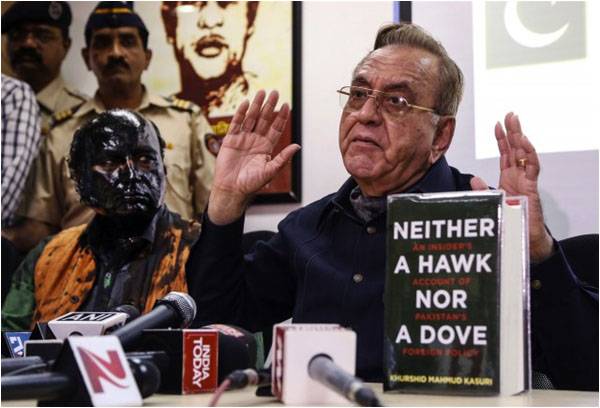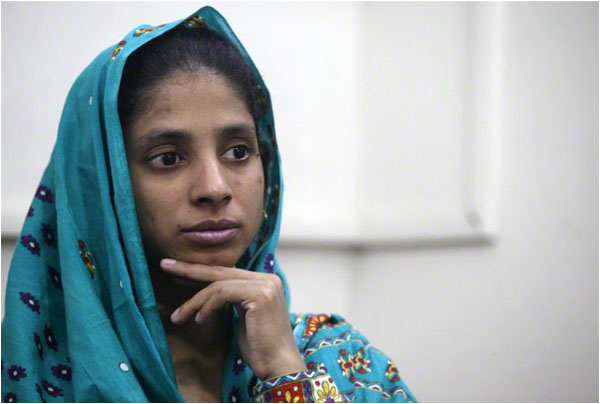
There is a strong desire for peace in India and Pakistan, when the hawkish fringe elements on both sides do not occupy the center stage. This has been demonstrated with the return of Geeta, who had accidently landed in Pakistan 15 years ago and was sent back to India almost with state honor. The story of Geeta, a deaf and mute girl who was cared for by philanthropist Bilquis Edhi, is inspiring. Pakistani people and government were equally enthusiastic about her return to her homeland, although her parents are yet to be identified.
Soon after Geeta’s return to India, news emerged about a similar case in India. New Delhi may facilitate the return of Mohammad Ramzan a 15-year-old Pakistani boy who was separated from his mother at the age of 10 when his father took him to Bangladesh and remarried. After being tortured by his stepmother, the boy crossed the border in 2011 with the hope of returning to his mother in Pakistan. Ramzan had travelled to many states before landing in Bhopal, where he was spotted by the police at the railway station on September 22, 2013. He was taken to a shelter home run by Childline. Ramzan has lived there since.
According to Pakistan Tribune, in September this year, a CA student from Bhopal traced the boy’s family in Karachi after he shared his pictures on social media. Ramzan’s mother, Razia Begum, contacted Pakistani human rights activist Ansar Burney with a request for his release and return. She also uploaded a video appealing to the Indian government to send her son home.
These are interesting developments amid the gloomy atmosphere after several incidents of intolerance and extremism. India’s External Affairs Minister Sushma Swaraj rightly said ties among the people of the two country are essential for moving towards peace. “We should not link a humanitarian case with politics,” she said while talking to reporters after receiving Geeta at the New Delhi airport. “In politics and in relations between two nations, people-to-people contacts have a huge role to play.”

There are tens of thousands of divided families on both sides, who would want to meet often, and the people of India and Pakistan also want uninterrupted social, academic and cultural ties. If India has decided to reciprocate Pakistan’s move by facilitating Ramzan’s return, it will indicate a will to move forward and improve the battered mutual relations. The proposed exchange has come at a time when the extremely intolerant right wing Hindu group Shiv Sena has done everything it could to dismantle the edifice of peace between the two countries – first by forcing the cancellation of noted singer Ghulam Ali’s concert in India, then making a bid to disrupt the book launch of former Pakistani foreign minister Khurshid Kasuri and smearing the face of its organizer Sidheendra Kulkarni, and then disrupting a planned meeting between Indian and Pakistani cricket board officials.
Although a fringe element in the large and inclusive India, Shiv Sena’s actions were not isolated incidents. Some see an apparent complicity by the Narendra Modi government. The ruling Bhartiya Janata Party which is partnering the coalition government with Shiv Sena in Mahrashtra, did decide to go alone in local council elections and made some statements of “displeasure”, but there has been no real action against the culprits. Similarly, the killing of Mohammad Akhlaq in Dardi town of in Uttar Pradesh on the suspicion of storing beef in his refrigerator, followed by the murder of Zahid Ahmad, a poor truck conductor, by right wing goons in Udhampur in Jammu, left a trail of intolerance that seemed to have the BJP government’s subtle approval. Delhi Police’s raid on Kerala House citing beef as a reason is another example of how the government continues to pursue its goal of a non-inclusive India.
While all this is a reality, there seems to be no dearth of peacemakers in India. Salman Khan’s film Bajrangi Bhaijan has a plot similar to Geeta’s story, although the nationality of the protagonist has been reversed. A Pakistani girl gets lost in India, and a large-hearted Indian decides to take her home. Salman Khan’s character is an earnest God-fearing Hindu who thinks eating meat is a sin. As a child, he attends meetings of the Hindu nationalist group RSS, sniffs disapprovingly when he smells meat being cooked next doors, and seeks forgiveness from God for ordering chicken at a restaurant. But he drastically changes when he goes to Pakistan to search for the girl’s parents. Since the movie is set in the interest of peace, it had an equal box office success in Pakistan. In a recent tweet, Salman Khan said Geeta’s return showed “the power of love”.
For the elements like Shiv Sena, there was a lesson in the movie. But the fact that they went scot-free with their wrongdoings has caused concern among a majority of Indians who don’t agree with their politics. But since this majority remains silent, it brings to us a new Hindustan, which presumably looks like a “very Hindu nation”.
The polarization card, as played by political groups patronized by governments, has kept the rational elements in India silent. But if gestures such as the return of Geeta and Ramzan continue with frequency, they will change the course of relations between India and Pakistan.
The author is a veteran journalist from Srinagar
Soon after Geeta’s return to India, news emerged about a similar case in India. New Delhi may facilitate the return of Mohammad Ramzan a 15-year-old Pakistani boy who was separated from his mother at the age of 10 when his father took him to Bangladesh and remarried. After being tortured by his stepmother, the boy crossed the border in 2011 with the hope of returning to his mother in Pakistan. Ramzan had travelled to many states before landing in Bhopal, where he was spotted by the police at the railway station on September 22, 2013. He was taken to a shelter home run by Childline. Ramzan has lived there since.
There are tens of thousands of divided families on both sides
According to Pakistan Tribune, in September this year, a CA student from Bhopal traced the boy’s family in Karachi after he shared his pictures on social media. Ramzan’s mother, Razia Begum, contacted Pakistani human rights activist Ansar Burney with a request for his release and return. She also uploaded a video appealing to the Indian government to send her son home.
These are interesting developments amid the gloomy atmosphere after several incidents of intolerance and extremism. India’s External Affairs Minister Sushma Swaraj rightly said ties among the people of the two country are essential for moving towards peace. “We should not link a humanitarian case with politics,” she said while talking to reporters after receiving Geeta at the New Delhi airport. “In politics and in relations between two nations, people-to-people contacts have a huge role to play.”

There are tens of thousands of divided families on both sides, who would want to meet often, and the people of India and Pakistan also want uninterrupted social, academic and cultural ties. If India has decided to reciprocate Pakistan’s move by facilitating Ramzan’s return, it will indicate a will to move forward and improve the battered mutual relations. The proposed exchange has come at a time when the extremely intolerant right wing Hindu group Shiv Sena has done everything it could to dismantle the edifice of peace between the two countries – first by forcing the cancellation of noted singer Ghulam Ali’s concert in India, then making a bid to disrupt the book launch of former Pakistani foreign minister Khurshid Kasuri and smearing the face of its organizer Sidheendra Kulkarni, and then disrupting a planned meeting between Indian and Pakistani cricket board officials.
Although a fringe element in the large and inclusive India, Shiv Sena’s actions were not isolated incidents. Some see an apparent complicity by the Narendra Modi government. The ruling Bhartiya Janata Party which is partnering the coalition government with Shiv Sena in Mahrashtra, did decide to go alone in local council elections and made some statements of “displeasure”, but there has been no real action against the culprits. Similarly, the killing of Mohammad Akhlaq in Dardi town of in Uttar Pradesh on the suspicion of storing beef in his refrigerator, followed by the murder of Zahid Ahmad, a poor truck conductor, by right wing goons in Udhampur in Jammu, left a trail of intolerance that seemed to have the BJP government’s subtle approval. Delhi Police’s raid on Kerala House citing beef as a reason is another example of how the government continues to pursue its goal of a non-inclusive India.
While all this is a reality, there seems to be no dearth of peacemakers in India. Salman Khan’s film Bajrangi Bhaijan has a plot similar to Geeta’s story, although the nationality of the protagonist has been reversed. A Pakistani girl gets lost in India, and a large-hearted Indian decides to take her home. Salman Khan’s character is an earnest God-fearing Hindu who thinks eating meat is a sin. As a child, he attends meetings of the Hindu nationalist group RSS, sniffs disapprovingly when he smells meat being cooked next doors, and seeks forgiveness from God for ordering chicken at a restaurant. But he drastically changes when he goes to Pakistan to search for the girl’s parents. Since the movie is set in the interest of peace, it had an equal box office success in Pakistan. In a recent tweet, Salman Khan said Geeta’s return showed “the power of love”.
For the elements like Shiv Sena, there was a lesson in the movie. But the fact that they went scot-free with their wrongdoings has caused concern among a majority of Indians who don’t agree with their politics. But since this majority remains silent, it brings to us a new Hindustan, which presumably looks like a “very Hindu nation”.
The polarization card, as played by political groups patronized by governments, has kept the rational elements in India silent. But if gestures such as the return of Geeta and Ramzan continue with frequency, they will change the course of relations between India and Pakistan.
The author is a veteran journalist from Srinagar

